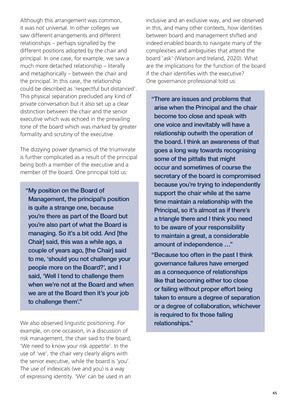
45
Although this arrangement was common,
it was not universal. In other colleges we
saw different arrangements and different
relationships - perhaps signalled by the
different positions adopted by the chair and
principal. In one case, for example, we saw a
much more detached relationship - literally
and metaphorically - between the chair and
the principal. In this case, the relationship
could be described as 'respectful but distanced'.
This physical separation precluded any kind of
private conversation but it also set up a clear
distinction between the chair and the senior
executive which was echoed in the prevailing
tone of the board which was marked by greater
formality and scrutiny of the executive.
The dizzying power dynamics of the triumvirate
is further complicated as a result of the principal
being both a member of the executive and a
member of the board. One principal told us:
We also observed linguistic positioning. For
example, on one occasion, in a discussion of
risk management, the chair said to the board,
'We need to know your risk appetite'. In the
use of 'we', the chair very clearly aligns with
the senior executive, while the board is 'you'.
The use of indexicals (we and you) is a way
of expressing identity. 'We' can be used in an
inclusive and an exclusive way, and we observed
in this, and many other contexts, how identities
between board and management shifted and
indeed enabled boards to navigate many of the
complexities and ambiguities that attend the
board 'ask' (Watson and Ireland, 2020). What
are the implications for the function of the board
if the chair identifies with the executive?
One governance professional told us:
"�My�position�on�the�Board�of�
Management,�the�principal's�position�
is quite a strange one, because
you're�there�as�part�of�the�Board�but�
you're�also�part�of�what�the�Board�is�
managing.�So�it's�a�bit�odd.�And�[the�
Chair] said, this was a while ago, a
couple�of�years�ago,�[the�Chair]�said�
to�me,�'should�you�not�challenge�your�
people�more�on�the�Board?',�and�I�
said,�'Well�I�tend�to�challenge�them�
when�we're�not�at�the�Board�and�when�
we�are�at�the�Board�then�it's�your�job�
to�challenge�them'."
" There are issues and problems that
arise when the Principal and the chair
become too close and speak with
one�voice�and�inevitably�will�have�a�
relationship outwith the operation of
the board. I think an awareness of that
goes�a�long�way�towards�recognising�
some of the pitfalls that might
occur and sometimes of course the
secretary�of�the�board�is�compromised�
because�you're�trying�to�independently�
support the chair while at the same
time maintain a relationship with the
Principal,�so�it's�almost�as�if�there's�
a�triangle�there�and�I�think�you�need�
to�be�aware�of�your�responsibility�
to maintain a great, a considerable
amount of independence …"
" Because too often in the past I think
governance failures have emerged
as a consequence of relationships
like that becoming either too close
or�failing�without�proper�effort�being�
taken to ensure a degree of separation
or a degree of collaboration, whichever
is�required�to�fix�those�failing�
relationships."